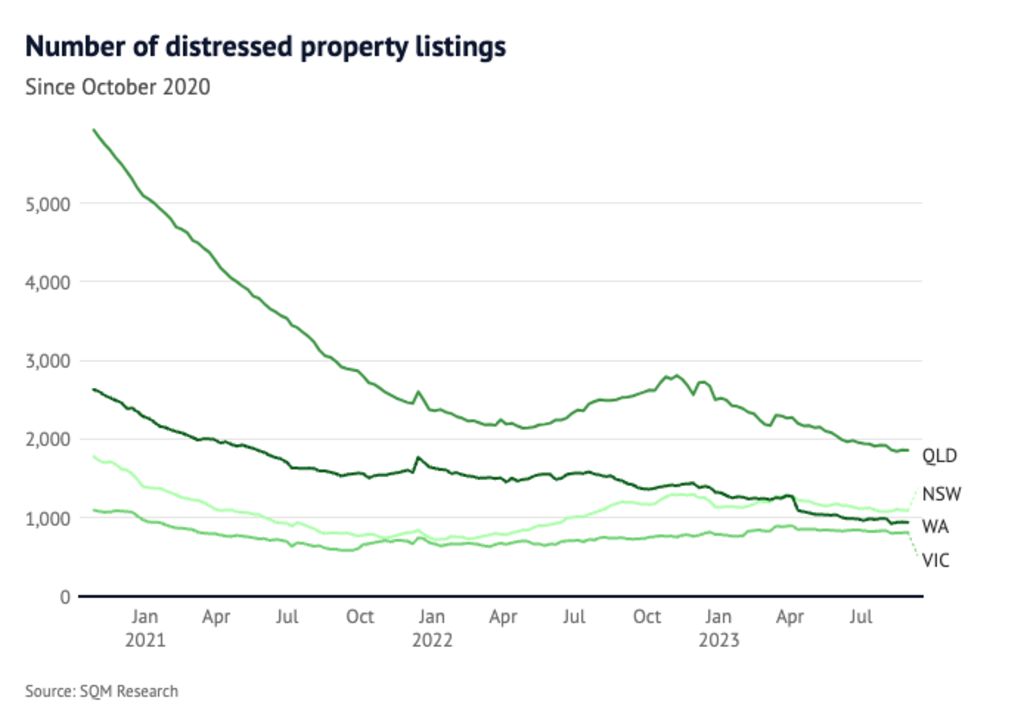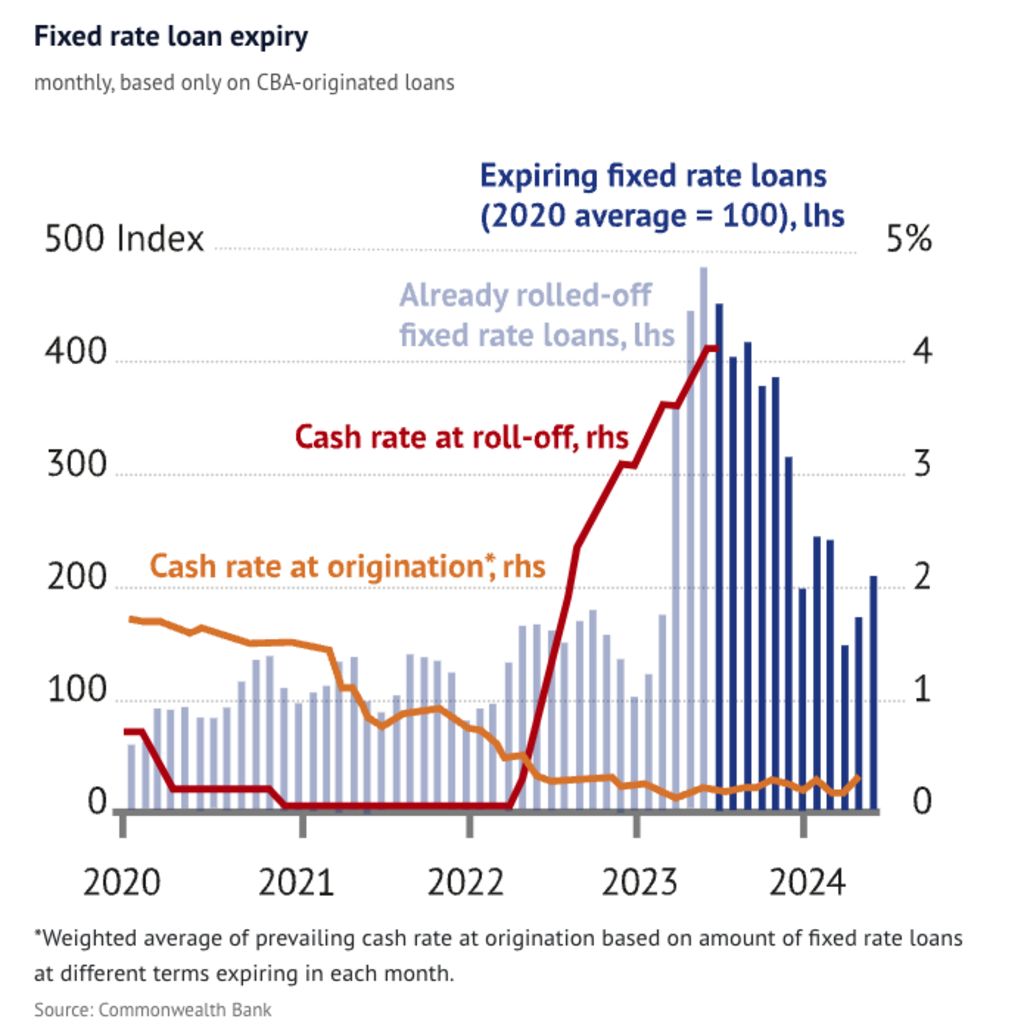Where are the home owners who can’t afford their mortgages?
An expected wave of home owners forced to sell because they cannot afford their mortgage has not yet materialised, despite the sharpest rise in interest rates in a generation.
But a national fall in distressed property listings masks a recent drift off their low point in Victoria and NSW, where there have been pockets of weakness, and the benign conditions may not last.

Economists had expected a greater rise in distressed sales by now after the cash rate jumped to 4.1 per cent and home owners who took out ultra-cheap fixed-rate loans began to roll off, facing thousands extra in repayments.
Efforts to stay afloat are working, as home owners cut discretionary spending, rent out spare rooms, refinance loans, or at worst sell their investment property or home before they are forced. Banks have been approaching at-risk customers who may need extra help.
“It’s very surprising given the interest rate rises and the fixed mortgage rate troubles that have been expected,” SQM Research founder Louis Christopher said. “But they just haven’t appeared.”
The latest SQM Research data shows distressed listings have been trending down nationally but the picture varies by state.

In NSW, there were 1091 distressed home listings in the last week of August, which is well down on three years ago as they hit 1779 in October 2020, but has ticked up from a trough of 722 in January last year.
Victoria recorded 814 distressed listings in the last week of August, down from 1096 in October 2020, but off its low of 586 in September 2021.
The biggest drop in distressed sales was in Queensland, where numbers fell from 5931 in October 2020, to 1859 in August. WA’s also fell over the same time from 2630 to 940.
Christopher said help from the banks, and a low unemployment rate of 3.7 per cent, were helping owners to pay the mortgage.
The next look at the health of the jobs market is due on Thursday. More home owners are due to roll off their fixed-rate loans and onto more expensive variable loans later this year and next, meaning risks lie ahead.

“Banks certainly are managing their customers,” he said. “Strengthened lending standards that were introduced in 2008 after the global financial crisis [which made lending much harder for people who can’t afford to repay a loan] have stopped this onslaught of distressed sales.”
The Australian Banking Association said almost 650,000 mortgages worth $376 billion were refinanced in the last financial year, the highest rate of refinancing ever.
A spokesperson said there had been an increase in hardship cases and banks were proactively seeking out people who needed help, such as to lengthen a loan term and reduce payments, offer short-term payment referrals or switch to interest-only payments for a period.
Among the home owners who have been able to hang on, many are feeling the pinch.
Roy Morgan research found a record 1.5 million were at risk of mortgage stress in the three months to July.
Calls to the National Debt Helpline have jumped by 28.5 per cent between January 1 and September 3, compared to the same time last year, figures from Financial Counselling Australia show.
A total of 94,859 calls were made across the country and mortgage stress was the number one reason for seeking advice.
National Debt Helpline financial counsellor Shae Robbins, who works with the Consumer Law Action Centre in Victoria, said discussions with clients had been about how to deal with financial distress and pay the mortgage.
“People on good incomes that could afford it before interest rates rose, now can’t afford to pay their bills and the mortgage,” Robbins said.
People were choosing not to pay bills, so they could afford mortgage repayments and meals, she said.
Others were rethinking their spending, Sydney-based Equilibria Finance managing director Anthony Landahl said, deciding to forgo overseas holidays, new car purchases, or delaying enrolling their children in private schools to save on fees.

Many had been using the savings they had in offset or redraw accounts, or were using their granny flats or spare rooms as an Airbnb, to earn extra money.
“People are definitely concerned about where the economy’s headed generally, especially if unemployment loosens up,” Landahl said. “They hope rates don’t rise again, but people do think there’ll be another rate rise.”
He said with more people due to roll off $150 billion of fixed-interest rate loans over the next 12 months, more pressure would be added to the market.
In Melbourne, Mortgage Choice Elsternwick mortgage broker Christopher Ladley said he had only come across one distressed sale recently, for a buyer who had moved to the UK and could no longer make higher repayments.
Others were holding on by making sacrifices in spending, or finding other ways to make the extra repayments.
“A client feeling the pinch who has a two-bedroom townhouse with a lot of space, we advised her to rent out a room for a while,” he said.
We recommend
We thought you might like
States
Capital Cities
Capital Cities - Rentals
Popular Areas
Allhomes
More

/http%3A%2F%2Fprod.static9.net.au%2Ffs%2F543439d5-b102-47eb-adf4-ad00c5267c07)
/http%3A%2F%2Fprod.static9.net.au%2Ffs%2Fd0b62099-96e1-4dae-92d8-5b2b3676f76f)







